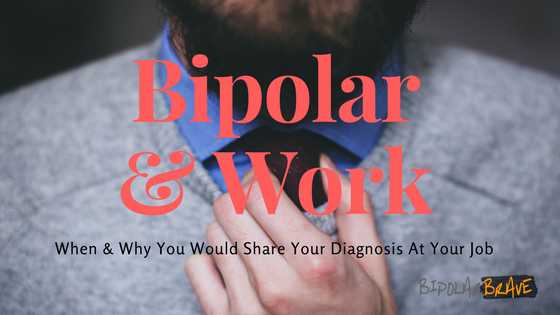It’s one thing to find a job and have bipolar disorder…it’s another thing to find a job when people know you have bipolar. As I look for work these days in a new town, I find my time has been structured enough that I’m not bored to tears, but I may just benefit from having a nice little part time 25-hour-a-week gig. So my friend Hannah and I are doing a vlog and she invited me to be on her HealthyPlace.com YouTube segment for Bipolar and Work. I’ll post the video when it airs, but for now, the gist of the matter I addressed was: When and Why would I ever share my diagnosis of bipolar at work?

Common sense may prevail for most on this one, but I wanted to put it out there in black and white, for those who are wondering.
Let’s just start with the fact that recently I put my diagnosis (or my blog here) into my resume for a social media specialist position in town. I had even introduced myself to the president of the company in-person and he personally asked me to send him my resume. Well, after having high-fived and exchanged business cards, he seemed like a pretty cool guy. That said, I have a hunch that aside from the fact that my superb resume and cover letter made me a great candidate, my “BipolarBrave.com” on the resume probably didn’t permit me the better chance of getting an interview.
Why did I share my bipolar theme? Two reasons: One, I’m pretty proud of it, if you couldn’t tell. It’s a big part of me. And Two, most employers these days Google you anyway, so why hide it if they’d find out anyway? (I realize not everyone posts their diagnosis on the internet too – I happen to though)
So when is it ever a good time to share your diagnosis and come out of the bipolar closet in the workplace? The answer to that will depend. Consider the following scenarios, assuming you are bipolar and have been stable a while:
- Your coworkers and clients know you well enough and trust you… you may share if there’s a discussion circling the subject, to help others see that your work ethics remain proven and unchanged despite your condition.
- Your coworkers or clients are dealing with a loved one or close friend who is in an episode and need comfort or direction. I’d say, share your tips and what you’ve learned from accepting the diagnosis and treating it the way you have.
- Your coworkers or clients are being discriminated because of it? Step up and say something. It may not change the situation, but it can certainly help normalize it and help others see it’s manageable.
- Your coworkers and clients aren’t educated on it, but want to know more. Share your story and take the opportunity to teach them how it is a treatable condition that doesn’t have to affect quality of life in a negative way.
Now, assuming your work is struggling due to your bipolar symptoms, you may want to disclose your condition to your supervisor in a confidential setting. Or you may not want to disclose at all.

In the end, always go with your gut. I would not share it before or immediately after you have gotten a job, but if your track record is clean and you find an appropriate situation to share so others can be enlightened, I’d say don’t be afraid to disclose. In the end, it’s your choice of course, but you may just surprise some narrow-minded outsiders for the better if you decide to be brave and share.
Have you ever shared your diagnosis at work? Why or why not? Let me know in the comments.

What do you think?